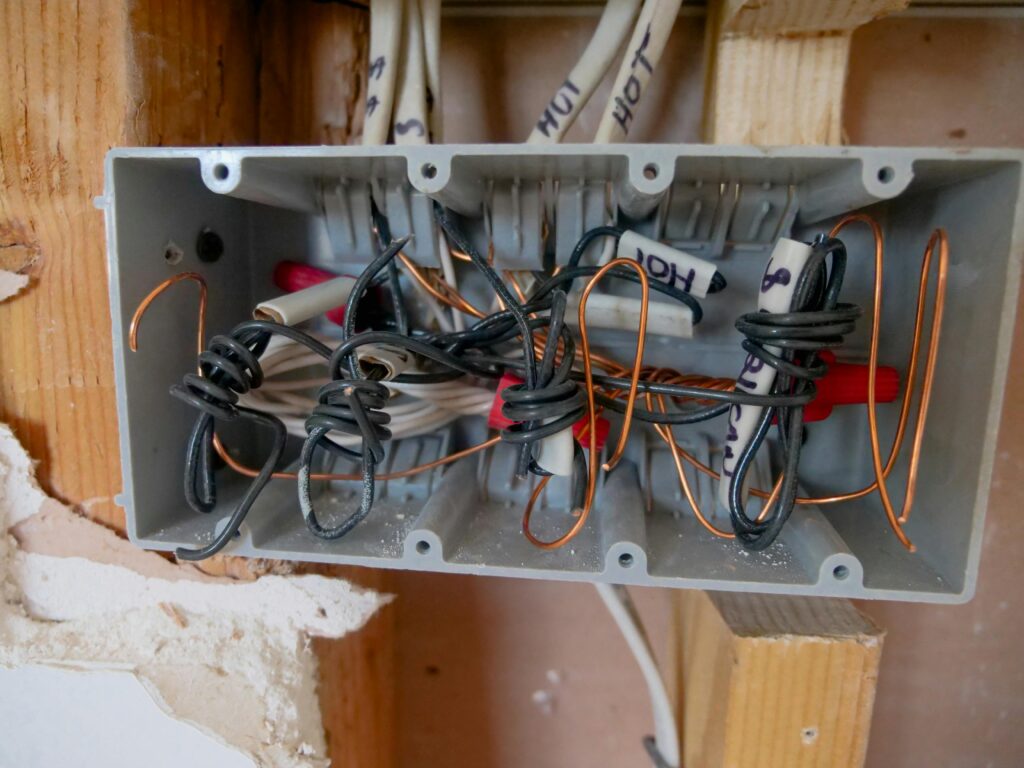Selling a home is already a complicated process, but it becomes even more challenging when code violations are involved. Whether it's outdated electrical work, structural issues, or unpermitted additions, these violations can impact your home’s value, limit buyer interest, and create financing hurdles. So, what are your options if your home doesn’t meet building codes?
In this roundup blog, we’ll explore the challenges of selling a house with code violations, key factors to consider, and expert insights on how to navigate the process—whether that means making repairs, negotiating with buyers, or selling as-is to a cash home buyer.
- What Are Code Violations?
- Common Code Violations
- Can You Sell a House with Code Violations?
- How to Sell a House with Code Violations
- Things to Consider When Selling a House with Code Violations
What Are Code Violations?
Code violations occur when a property fails to meet local building codes and safety regulations. Violations can range from minor infractions, like missing handrails, to serious issues, like faulty wiring or structural instability. Local building departments enforce these codes, and homeowners may face fines, required repairs, or obstacles when selling a property that isn’t up to code.
While most cities adopt widely recognized codes like the International Residential Code (IRC), they often add their own specific regulations to address regional concerns. National standards, such as the National Electrical Code (NEC), govern specialized areas like electrical work.
Because building codes are regularly updated, older homes may not always comply with current standards. Homeowners may unknowingly create violations through DIY renovations that don’t meet code requirements. Additionally, codes can vary by jurisdiction, meaning a home that meets standards in one city may be non-compliant in a neighboring area.
Common Code Violations
Code violations can range from minor fixes to major structural or safety concerns. Here are some of the most common issues that can come up when selling a home:
Electrical & Wiring Issues
- Overloaded Electrical Panels: Too many circuits or an outdated panel can create fire hazards.
- Incorrect Circuit Amps: Kitchens and utility rooms typically need 20-amp circuits, while most household circuits use 15 amps.
- Missing Ground-Fault Circuit Interrupters (GFCIs): Kitchens, bathrooms, garages, and outdoor outlets need GFCIs to prevent electrical shock.

Plumbing & Water Heater Problems
- Aging or Faulty Plumbing Materials: Older homes may have polybutylene piping, which is prone to leaks.
- Missing Expansion Tanks on Water Heaters: These tanks help prevent leaks caused by pressure buildup.
- Improper Bathroom Venting: Exhaust fans should vent outside, not into the attic, to prevent mold and moisture damage.

Structural & Safety Concerns
- Improper Staircases & Handrails: Handrails should have proper returns to prevent clothing from getting caught, and stairs must meet height and spacing requirements.
- Basement Bedroom Egress Issues: Basement bedrooms must have an egress window or door for emergency exits.
- Blocked or Missing Egress Exits: Every bedroom and living area must have a safe exit route in case of an emergency.
Roofing, Windows, & Exterior Violations
- Roofing Violations: Certain roof slopes require specific materials; using shingles on a low-pitch roof can cause leaks.
- Improper Window Installation: Windows must be free of cracks, properly sealed, and meet safety standards, especially near stairways or large glass areas.
- Missing or Faulty Deck Flashing: Deck flashing prevents water damage between the deck and the house.

Permits & Zoning Issues
- Unpermitted Renovations: Any major remodels, additions, or basement conversions that weren’t approved may need permits or even removal.
- Fence & Property Line Issues: Some cities require permits for fences, and they must be placed within property boundaries.
Fire & Safety Code Violations
- Misplaced or Missing Smoke Alarms: Smoke detectors should be installed on every level of the home and outside each bedroom.
- Inadequate Insulation: Homes must meet minimum insulation standards for energy efficiency and proper ventilation.
Can You Sell a House with Code Violations?
Yes, you can sell a house with code violations, but there are a few things to consider. You’ll need to disclose any known violations to potential buyers, typically through a property disclosure form. Being upfront about these issues is important to avoid legal problems later on.
Code violations can also impact your home's value. Buyers may ask for a lower price to cover the cost of fixing the issues, or they might pass on the property entirely if the problems are too significant. On top of that, many lenders won’t finance homes with code violations, which can make it harder to find a buyer.
If you can, it's often best to address the violations before listing the house. But if fixing them isn’t an option, selling to a cash buyer could be a simpler solution. Cash buyers often purchase homes as-is, so you won’t have to worry about repairs, and the process can be much quicker.
How to Sell a House with Code Violations
Step 1: Disclose the Violations
Honesty is crucial when selling a house with code violations. You’ll need to disclose any known violations to potential buyers, typically through a property disclosure form. Failure to do so can lead to legal complications, so it’s important to be upfront about the issues.
Step 2: Assess the Cost of Repairs
Get a clear idea of what it will take to fix the violations. Contact professionals to estimate repair costs for major issues like electrical or plumbing violations. This will help you decide if making repairs before selling is worth it or if it’s more cost-effective to sell the home as-is.
Step 3: Get Multiple Repair Estimates
If you’re not sure whether to make repairs or sell as-is, getting multiple estimates from contractors can help you weigh your options. Sometimes, a buyer may be willing to negotiate the price based on the estimates you provide, allowing you to sell quickly without doing all the repairs yourself.
Step 4: Decide If You Should Fix the Violations
If the violations are minor and repairs are affordable, taking care of them before listing the house can make it more attractive to buyers. For bigger issues, it might still be worth fixing if the cost won’t eat into your selling price too much.
Step 5: Consider Selling As-Is to a Cash Buyer
If the violations are too costly or extensive, selling to a cash buyer might be your best option. These buyers typically purchase homes as-is and are experienced with properties that have code violations. The process can be faster, and you won’t have to deal with the hassle of repairs or lengthy negotiations.
Step 6: Be Transparent with Buyers
If you’re selling the house with the violations still in place, be clear with buyers about what needs fixing and why. Providing repair estimates or documentation about the issues can help build trust and avoid surprises later in the process.
Things to Consider When Selling a House with Code Violations
Here’s what our cash home buying experts say you need to consider when selling a house with code violations.
1. Full Disclosure & Transparency Are Key
“Selling a house with code violations is possible but comes with challenges. Full disclosure is crucial, as failing to inform buyers could lead to legal issues. Code violations can lower your home’s value, limit buyer interest, and make financing difficult since many lenders hesitate to approve loans for such properties.
If you have code violations, start by contacting your local building department to understand the issues. Getting repair estimates can help determine whether fixing major violations before listing is worthwhile. Be transparent with buyers about the violations and any plans to address them. If repairs are too costly, consider selling to a cash buyer who specializes in properties with code issues.”
2. Expect Price Negotiations
“Selling a house with code violations may seem daunting, but it’s entirely possible with the right approach. Whether the issues are minor, like outdated wiring, or more serious, like unpermitted additions, full disclosure is essential. Buyers will factor in the cost of repairs, so expect price negotiations. If fixing the violations isn’t feasible, selling the home as-is is an option, though it may limit buyer interest or financing opportunities.
To navigate the process smoothly, consider consulting a real estate expert, assessing repair costs, and being upfront with potential buyers. Some sellers choose to fix violations before listing, while others offer a credit to cover repairs. Regardless of the path you take, staying informed and transparent will help you sell your home successfully.”
3. Risk of the Sale Falling Through
“Selling a house with code violations can present unique challenges for homeowners. Unpermitted additions, electrical issues, roof problems, and many other violations often surface during the due diligence period, which can potentially stop the sale. This is because most retail buyers are not able to, or don’t want to deal with the process of having to do the research with the different towns, counties, municipalities, cities, etc. to have the violations addressed, which can also be quite costly.
For homeowners seeking a faster solution, selling to cash buyers like the team at New Again Houses has become an increasingly popular option. They are able to purchase properties as-is, eliminating the need for costly repairs and dealing with lengthy compliance processes.”
4. Thousands of Dollars in Repairs
“Code violations can delay sales and cost thousands in repairs. Bringing a home up to code is time-consuming, but selling for cash allows homeowners to skip costly fixes, avoid fines, and close quickly. Cash buyers take properties as-is, making the process smooth. Full disclosure is key to avoiding legal issues and ensuring a hassle-free sale.”
5. Correcting Violations
“Selling a house with code violations comes with many issues and complications. First of all, you won't be able to get a mortgage or complete the closing until said violations are corrected. Some common violations that come up are additions made to a home without proper building permits, converting garages to rooms, replacing water heaters, and upgrading the electrical system. When these issues come up, the homeowner must now hire a contractor to correct these violations, which will cost the homeowner both time and money.
Selling your house for cash can help a homeowner sell their home without having to go through this costly and time-consuming process of finding and hiring a contractor to correct violations in order to sell their house. A cash offer is the solution and can allow a homeowner to sell within a week or two and move on with their lives.”
6. The Need for a Licensed General Contractor
“Code violations can be a real hassle. They are particularly hard to resolve on your own if you don't have a licensed general contractor. Your city or county will want to see your property brought up to code by a licensed general contractor, which can be quite costly. Selling your home for cash is a smart option in this situation because there are risks and liabilities if you sell traditionally. If you have a property that is not up to code, then you could be sued if something were to happen. Selling your home in that condition for cash passes the liability to the cash buyer who is aware and prepared for the violations. The cash buyer knows how to handle and resolve those violations.”
7. Unwanted Holding Costs
“Code violations must be disclosed to the buyer up front and will sometimes require significant costs in repairs, will deteriorate the purchase price significantly, or even scare aware traditional buyers. Selling a house with code violations to a cash buyer is beneficial for several reasons. It limits the aggravation of dealing with those costly repairs and delays the sale for long periods of time dealing with permits and local code enforcement agencies. Cash buyers, and particularly real estate developers, are experienced in dealing with code violation corrections and working with local permit offices. Cash buyers understand the risk that comes with code violations and are willing to take on that responsibility with the purchase. Cash buyers are also ready buyers that can purchase a house quickly which could otherwise sit, driving up unwanted holding costs.”
8. Difficulty Finding Buyers
“When selling a house with code violations on the market, you may have difficulty finding a buyer willing to put in the time or money required to bring the different violations back to code. Full disclosure of violations is critical or there could also be legal consequences involved. All of these factors could leave your house sitting on the market for months without a buyer. Cash buyers (like us!) will consider all the repairs and costs needed to bring the house back to code when making our offer. We’re able to be the solution that quickly takes care of the headache and stress you may be facing!”
9. Meeting Lender Requirements
“Selling a home with code violations can be stressful, time-consuming, expensive, and a HUGE headache. Traditional buyers often require repairs to meet lender requirements, which can delay the process and increase costs for the sellers. Selling to us for a fair cash offer allows us, the experts, to work with the codes office to get the home up to code without the hassle of inspections, repairs, or legal issues. We will take care of all the code requirements during our remodel.”
10. Dealing with Codes Department
“If you are trying to sell your home with code violations, the process can be slow, stressful, complicated, time-consuming, and expensive. Dealing with the codes department can often be a slow process. It takes time to pull the correct permits and to have the work needed approved. After approval, finding a responsible and reliable contractor can be challenging and stressful. Once work has begun you will need to work with the codes department to schedule inspections to make sure the work is being completed to the standard of the code. Finally, when the work is complete, you can schedule the final inspection and will need to pass it in order to receive the green tag. You will then be able to sell your home. To avoid this process and dealing with delays and costly repairs, you can sell your home to a cash buyer. Cash buyers work with code departments on a regular basis and are equipped to handle the process. Selling your house to a cash buyer is a much quicker and simpler process. Closing can be completed in as soon as 7 days.”
Selling a House with Code Violations? Contact New Again Houses Today!
If you're looking to sell a home with code violations, it’s important to understand your options and approach the process strategically. Whether you choose to make repairs, negotiate with buyers, or sell the house as-is to a cash buyer, being transparent and informed is key to a smooth sale.
At New Again Houses, we specialize in buying homes with code violations, offering a simple, stress-free selling experience. We buy houses as-is, saving you the time, hassle, and expense of repairs. If you’re ready to sell your property quickly and with minimal complications, contact New Again Houses today!










